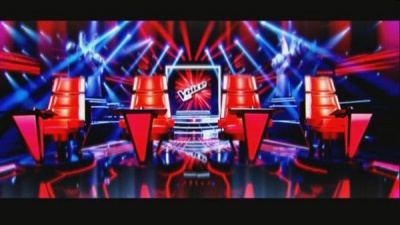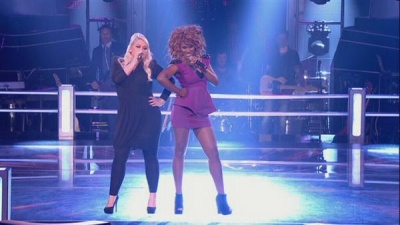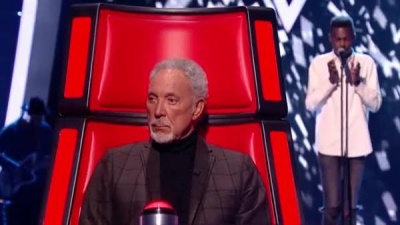The Voice UK
Contents |
Host
Holly Willoughby (2012-13)
Reggie Yates (2012-13)
Emma Willis (2014-)
Marvin Humes (2014-16)
Y Llais: Sian Eleri
Co-hosts
Vocal coaches:
will.i.am (all series)
Tom Jones (2012-15, 2017-)
Danny O'Donoghue (2012-13)
Jessie J (2012-13)
Kylie Minogue (2014)
Ricky Wilson (2014-16)
Rita Ora (2015)
Paloma Faith (2016)
Boy George (2016)
Jennifer Hudson (2017-19)
Gavin Rossdale (2017)
Olly Murs (2018-23)
Meghan Trainor (2020)
Anne-Marie (2021-23)
LeAnn Rimes (2024-)
Tom Fletcher and Danny Jones (2024-)
The Voice Kids coaches:
will.i.am (all series)
Pixie Lott (all series)
Danny Jones (all series)
Jessie J (2019)
Paloma Faith (2020)
Mel C (2021)
Ronan Keating (2022-23)
Y Llais coaches:
Bryn Terfel
Bronwen Lewis
Aleighcia Scott
Yws Gwynedd
BBC Two coverage (The Voice: Louder on Two, 2014):
Zoe Ball
CBBC coverage (The Voice UK: Hacker and Dodge Barkstage, 2015):
Hacker and Dodge
Online coverage (The Voice: The V Room):
Cel Spellman (2017)
Jamie Miller (2018: first half)
Vick Hope (2018: second half)
AJ Odudu (2019, 21)
Broadcast
Wall to Wall and Talpa for BBC One, 24 March 2012 to 9 April 2016 (67 episodes in 5 series)
ITV Studios Entertainment and Talpa for ITV, 7 January 2017 to 20 March 2021
Lifted Entertainment and Talpa for ITV, 3 September 2022 to present
The Voice: Louder on Two
Wall to Wall and Talpa for BBC Two, 24 March to 4 April 2014 (10 episodes in 1 series)
The Voice UK: Hacker and Dodge Barkstage
Wall to Wall and Talpa for CBBC, 11 January to 9 April 2015 (9 episodes in 1 series)
The Voice: The V Room
ITV Studios Entertainment and Talpa for ITV Hub and s.tv, 7 January 2017 to present
The Voice Kids
ITV Studios Entertainment and Talpa for ITV, 10 June 2017 to 29 August 2020 (32 episodes in 4 series)
Lifted Entertainment and Talpa for ITV, 27 December 2021 to 15 July 2023 (9 episodes in 3 series)
Y Llais
Boom Cymru for S4C, 9 February 2025 to present
Synopsis
Originating in the Netherlands, this is a singing competition with a difference (or, as it's known to the rest of us, a gimmick). The judges, known as coaches, sit with their backs to each contestant as they audition, meaning that the only thing they have to base their opinion on is the contestant's voice.
As with a number of other talent competitions, the first stage is not broadcast and sees the hopefuls audition before the producers in the hope of impressing them, and being put through to audition in front of the coaches. Unlike other talent shows, however, where contestants who perhaps aren't cut out to be singers are put through to audition for the coaches to make for so-called good TV, only contestants who can hold a tune stand a chance of being put through.
The second stage, and the first one televised, is the blind auditions. Here the contestants, known as artists, perform on a stage in a TV studio (located at BBC Television Centre in the first series, MediaCityUK in Salford thereafter). At the bottom end of the stage are four large red chairs, facing away from the stage towards the audience beyond. Each chair has a screen on the back with the coach's name on it, while on the front of the chair is a small desk, with a large red button. As each artist performs, the coaches listen, and if they like what they hear enough, they can press their red button to spin their chair around, and indicate their interest in having that artist on their team. In the event that no coach presses their button by the end of the artist's performance, that artist is eliminated from the competition. If more than one coach presses their button, the power switches to the artist, and they can choose whose team they want to be on. Each coach needs to be careful about when they choose to press their button, as they are restricted to taking twelve artists (ten in the first series) through to the next round.
After several weeks of blind auditions, and once all four coaches have filled their teams, the next stage, the battle rounds get underway. In this stage, each coach's 12 artists are paired off, and are mentored by their coach in preparation for singing against each other. In the studio, each pair performs the same song at the same time in an attempt to vocally outshine their opponent. At the end of performance, their coach must decide who to keep on their team, and who to eliminate. For the second series a 'steal' twist was introduced at this stage. This meant that an artist who had been eliminated by their coach could remain in the competition with another coach, if one of the other coaches pressed the button on their chair within a given period of time. As with the blind auditions, if more than one coach pressed their button, the artist was able to choose. Each judge could only use their steal once, meaning they had to use it wisely.
In the first series, the artists who had won their duels in the battle rounds went straight through to the live shows. However the second series introduced a new stage, the knockout round. This round starts with each coach having seven artists, six winners of the battle rounds, and one artist stolen from another coach. Each artist performs a 'killer' song, with their coach choosing three out of their seven artists to progress to the live shows.
The final stage of the competition is the live shows. In the first series, each coach started the live shows with five artists. Across a series of four live shows, each week saw all of the artists from two of the teams perform. The first time around this resulted in the elimination of a single artist from each coach's team. The second time around two artists from each coach's team were eliminated, with the remaining two artists in each coach's team progressing to the semi-final. These artists performed again in the semi-final with one more artist from each team being eliminated, and the remaining artist progressing to the final. In the second series, each coach started the live shows with three artists, with there being just two live shows before the final. Each of the live shows saw all of the artists perform, with one artist from each coach's team being eliminated each week. In each variation, the format is constructed in such a manner that each coach is guaranteed to have one artist in the final, unlike The X Factor where a judge can reach the final with no acts left in their category. In the final each artist performs a number of songs, before the final votes are tallied, and the winner is announced. The winner receives a recording contract with Universal Music.
The third series in 2014 played out in broadly the same manner, however there were several changes in personnel. Danny O'Donogue and Jessie J left their spinning chairs behind, making way for Kylie Minogue and Kaiser Chiefs frontman Ricky Wilson. Holly Willoughby and Reggie Yates also moved on, leaving the door open for Emma Willis and ex-JLS singer Marvin Humes to take over the reins.
The series started airing in January, as opposed to its previous March airdate for the first two series. This move ended a typically tabloid-fuelled ratings battle with Britain's Got Talent. 2014 also brought in a spin-off for the final weeks of the contest. The Voice: Louder on Two began on 24 March, the Monday after the first live show. It was closely modelled on Strictly Come Dancing: It Takes Two, sharing the same 6.30 timeslot and the same host Zoe Ball.
Minor changes for the 2015 series: Kylie was replaced by Rita Ora, and Louder on Two was discontinued. Its replacement was a series of four-minute clip shows on the CBBC channel, hosted by resident stars Hacker and Dodge.
Tom Jones was not invited back for the 2016 series, and he took to the press to bemoan his bad treatment. "I was told yesterday, with no consultation or conversation of any kind, that I would not be returning." Rita Ora also left the spinning chairs, their replacements were Paloma Faith and Boy George.
BBC Loses Voice
Right from the start, the BBC had been criticised for having a nakedly commercial show on its schedule. "A complete nonsense", claimed the chairman of Channel 4. The Voice was called "insufficiently distinctive" in a government review of the BBC in 2015.
"The BBC should be banned from buying overseas formats," said ITV in 2015. Earlier that year, ITV had bought Talpa Television. The BBC's contract expired after the 2016 series, after which ITV sold The Voice to itself.
Tom Jones was brought back for the ITV series, his removal the previous year had been handled without grace. The new producers also secured the American Idol alumna Jennifer Hudson, and former Bush frontman Gavin Rossdale.
The new series followed a familiar format: seven weeks of blind auditions, though singers rejected by the judges weren't able to talk to the panel. Battles took place over one weekend. The knockout phase was a live broadcast, with viewers putting two singers through and the coach adding a third. Each coach progressed one of their team through the quarter-final, ensuring they'd all have a stake in the semi-final.
Viewers found the new format to be slicker than in the past. Emma Willis was not stretched in the auditions, but came into her own in the later rounds. The adverts inevitably disrupted the show, and plugs for Universal were blatant, but they stopped the show from falling into a routine.
More changes to the chairs in later years: Olly Murs replaced Gavin Rossdale in 2017, Jennifer Hudson was replaced by Meghan Trainor (2020) and Anne-Marie (from 2021). The shows remained similar: seven weeks of auditions, two battle weeks, a knockout round, before the two live shows to finish the series.
The 2020 series was curtailed by the pandemic; a pre-recorded semi-final and live final were pushed from spring into November, with Meghan Trainor contributing via video link. A virtual audience was used for the final, and the whole 2021 series.
The Voice marked its tenth anniversary in 2022 by moving from the start of the year to September and October. A shorter series knocked out the Battle and Knockout Rounds, replacing them with "Callbacks" - groups of four contestants sing the same song, the coach picks the best to progress to the semi-finals. Both semi and final were recorded, with the studio audience and a virtual audience picking the victor.
Just as interest was waning on ITV, The Voice was picked up by Welsh-language broadcaster S4C, and hosted by Radio 1's Sian Eleri. The judges were Bryn Terfel (opera singer), Bronwen Lewis (pop star), Aleighcia Scott (reggae star), and Yws Gwynedd (lead singer with the band of the same name). The series lasted eight episodes.
Inventor
Based on the Dutch format, The Voice of Holland, and credited as being devised by Talpa Distribution B.V.
Champions
2012 Leanne Mitchell, as mentored by Sir Tom Jones
2013 Andrea Begley, as mentored by Danny O'Donoghue
2014 Jermain Jackman, as mentored by will.i.am
2015 Stevie McCrorie, as mentored by Ricky Wilson
2016 Kevin Simm, as mentored by Ricky Wilson
2017 Mo Adeniran, as mentored by Jennifer Hudson
2018 Ruti Olajugbagbe, as mentored by Tom Jones
2019 Molly Hocking, as mentored by Olly Murs
2020 Blessing Chitapa, as mentored by Olly Murs
2021 Craig Eddie, as mentored by Anne-Marie
2022 Anthonia Edwards, as mentored by Tom Jones
2023 Jen & Liv, as mentored by will.i.am
2024 Ava, as mentored by Tom Fletcher & Danny Jones
The Voice Kids
2017 Jess Folley, as mentored by Pixie Lott
2018 Daniel Davies, as mentored by Pixie Lott
2019 Sam Wilkinson, as mentored by Danny Jones
2020 Justine Afante, as mentored by Pixie Lott
2021 Torrin Cuthill, as mentored by Mel C
2022 Israella Chris, as mentored by Pixie Lott
2023 Shanice & Andrea Nyandoro, as mentored by will.i.am
Merchandise
The Voice UK: Access All Areas was on sale during series 1.
Trivia
The 2020 series took a break after the battle rounds had been broadcast as a consequence of the Covid-19 pandemic. When it returned, Meghan Trainor contributed from her home in LA. That series' third-placed finallist, Brooke Scullion, would later represent Ireland at the Eurovision Song Contest.
Several other acts, although no winners, have found fame as a result of appearing on the show. Becky Hill, one of the semi-finallists on the first series, carved out a long career as a singer on dance records, including a BRIT award in 2022; she would later be a mentor on Project Icon. Shellyann Evans, who was eliminated in the Knockout rounds in 2015, would later win the second series of All Together Now, while Jordan Gray, who was a semi-finalist in 2016, would later become notorious as a comedian. Bronwen Lewis didn't get past the initial Spinning Chairs round in 2013; she became a big hit in Welsh-language pop and was in the chair herself on Y Llais. And oh, alright, inaugural The Voice Kids champion Jess Folley would later be herded into Real Like You, who won X Factor: The Band.
Of note is the number of champions who changed their stage names after winning the programme; Mo Adeniran and Blessing Chitapa changed their names to Mo Jamil and Blessing Annatoria, their first and middle names, while Ruti Olajugbagbe, whose first and middle name is Ruth Oluwumi, opted to use the stage name Ruti. (Hmm.) Jen & Liv later changed their name to Hunni, but their name change had a more innocuous explanation; they liked the Jessica Alba movie Honey.
Web links
Wikipedia entry (The Voice Kids)
The show publicised social media: #thevoiceuk, @bbcthevoiceuk (latterly @thevoiceuk), and facebook/bbcthevoiceuk.
See also
Weaver's Week reviews: 2012 and 2017.





